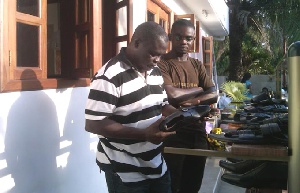Success, they say, has many routes and so it seems. This statement perhaps best describes Tonyi Senayah, the Managing Director of Horseman Shoes, who has now shot to fame for being the brain behind President John Mahama’s locally made shoes. The very shoes making headlines.
Senayah, a young entrepreneur in Kumasi, founded Horseman Shoes in 2010 and the company quickly took off. Horseman shoes is a Ghanaian based footwear manufacturing company that makes quality and fashionable footwear with the finest of leather some of which are men's dress shoes, unisex sandals and slippers, school sandals and security boots.
In 2011, Senayah was named young entrepreneur of the year at the Global Professional Achievers Awards in Accra. Senayah and his shoe manufacturer were also given the Outstanding Product Quality award from African Leadership Magazine in 2013. His goal is to lead Horseman Shoes to become Africa’s largest footwear manufacturer.
Senayah has a bachelor’s degree from the University of Ghana, where he was also a student leader. In 2009, he noticed a demand for high-quality shoes and knew of a lot of young and skillful shoe makers who were looking for work. He put the two elements together and started his shoemaking business from the ground up, first buying from local manufacturers, then establishing his own workshop. Senayah says that the key to success is overcoming the fear of failure.
He noted: “You have to be something extraordinary to be successful here in Africa. Startup entrepreneurs run and manage all facets of their enterprises. These include production, finance and marketing duties, among others.”
As you start your own business you realise it requires a great deal of discipline and tenacity to carry on. These, among other virtues of entrepreneurship, I have come to learn with time, he concluded.
Mr. Senayah could not hide his excitement at such a high level endorsement of his product. He told Business Day that though his company had won several awards in the past, the presidential endorsement had instantly elevated his company and also increased demand for its products.
“Horseman Shoes are very nice and very comfortable shoes. In fact, I am wearing a pair right now,” the President stated during his address.
Mr. Senayah said: “We have been overwhelmed by orders as people continue to place demand for our shoes because of the President’s endorsement. This means with presidential endorsements of local products, our businesses will boom and we will all contribute towards changing the structure of our economy.”
He continued: “When local companies gain such presidential endorsements, it goes a long way to change the mentality we have of our own products.”
Mr Senayah further stated: “We are surrounded by lots of opportunities. The most important step is the beginning. Young people should step out of their comfort zones and try. They should not let the fear of failure hold them back; with the right attitude and determination, everything is achievable.”
Meanwhile, the Chief Executive Officer of Reroy Cables Limited, a local manufacturer of electrical cables and conductors, Kate Quartey-Papafio who happened to have been part of a meeting held with the President prior to the State of the Nation’s Address, was excited at the proactive manner government intends to support the local industries.
Speaking to Business Day, she specifically made reference to the portion of the President’s address which tasked the Board and Management of the Electricity Company of Ghana to purchase cables, transformers and meters from the local manufacturers, who meet quality standards.
Mrs. Quartey-Papafio said presidential engagement with the business community should be regular, realising the swift response with which the president addressed the concerns they raised at the meeting.
“I believe such high level meetings should be encouraged as long as the President recognises the private sector as the engine of growth that could possibly lead the change in the structure of our economy,” Mrs. Kate Quartey-Papafio noted.
Business News of Tuesday, 4 March 2014
Source: Business Day
Tonyi – The President’s Shoe Maker
Entertainment












